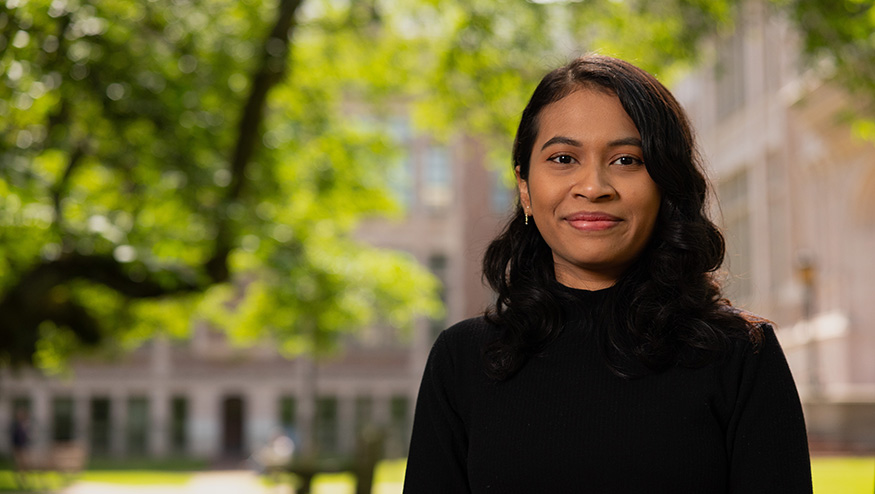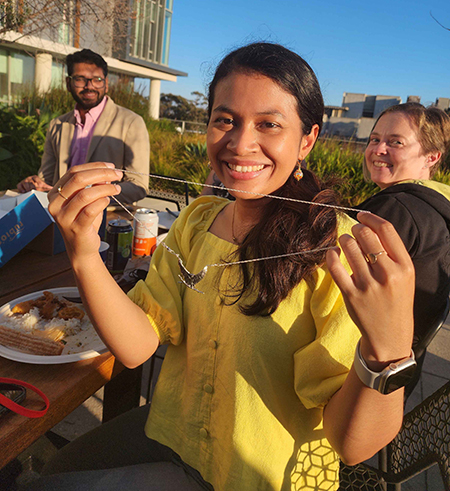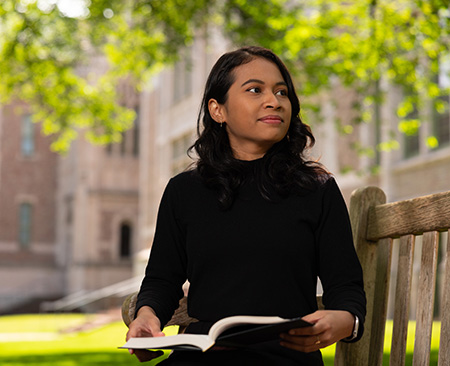
As a child in Jakarta, Indonesia, Anselma Prihandita read Indonesian folktales and fairy tales with her mother. Later, faced with a dearth of middle-grade books by Indonesian authors, she turned to Harry Potter novels, "The Lord of the Rings," and other Western fantasy series.
“Sometimes I’d read the first three books in a series translated into Indonesian, but the next books in the series weren’t translated yet,” Prihandita recalls. “I just had to read them right now, so my dad got me the English language versions, which I would read along with a dictionary. I had to look up almost every word. You could say that my interest in speculative fiction — fantasy and science fiction — went side by side with my learning English.”
Prihandita, who graduated this month with a PhD in language and rhetoric from the UW Department of English, is still immersed in both speculative fiction and the study of the English language. She completed a dissertation that explores writing challenges faced by historically marginalized students, while also producing short stories in the speculative fiction genre.
Days before graduation, Prihandita won a Nebula Award for one of her stories. She is first Indonesian writer to win — or even be nominated — for this award, which is among the most prestigious in the science fiction/fantasy genre.
A Dissertation Enhanced by Storytelling
Prihandita tried writing stories in grade school, but at the time her ambition overwhelmed her abilities. “Because I was reading mostly novels, I tried to write novels, but of course that was too big a project for a ten-year-old,” she says. “I would get one or two chapters down and not know what to do next and then just move on.” As an undergraduate at Universitas Indonesia, she majored in English literature but took just one creative writing class.
I feel like my creative works have always been part of my scholarly works. They just do different things, each making arguments that the other cannot.
What got Prihandita writing again was the pandemic. “Everyone was talking about needing a hobby then,” she recalls. “I remembered that I used to like writing stories, so I figured I could try that.” She had to find time in an already packed schedule, since she was serving as a writing instructor and assistant director of the English department’s Program in Writing and Rhetoric while working toward her PhD. But she discovered that creative writing allowed her to think differently — even about her doctoral work.

Prihandita’s doctoral dissertation looks at how structures of inequality disrupt the writing practices of historically marginalized students and international students. She came to the topic after teaching introductory writing courses and observing the challenges her students faced.
“Students who come from places that are not ‘the West’ come with knowledges that are not based on the Western traditions,” Prihandita explains. “Being at a US university, they have to gain skills to translate themselves to an audience that knows nothing about their context, while still holding onto their own traditions and knowledges and not completely erasing that to fit into the predominantly American culture.”
In her speculative fiction writing, Prihandita has further explored that challenge. The story that earned her a Nebula award, “Negative Scholarship on the Fifth State of Being,” centers around a human doctor who must treat a very rare alien species using only artificial intelligence assistance and translation machines. The doctor soon realizes that translating words and using officially sanctioned databases aren’t sufficient for understanding this individual from a totally unfamiliar culture. The doctor must find a different way to help.
“That story is actually a translation of one of my dissertation chapters into story form,” says Prihandita. “It was a way to work through scholarly questions and theoretical concepts from my research. The alien is a metaphor to show how to engage emotionally and experientially with people who are in a marginalized position. It’s not something I’d been able to demonstrate in my dissertation, which is a more logical form of writing. But I felt that the experience offered by the story was an important part of my overall argument, so I decided to include the story in my dissertation.”
Inspired by a Course
Prihandita credits Nazry Bahrawi, UW assistant professor of Asian languages and literature, with helping her find the connection between her creative writing and her scholarly interests. Bahrawi teaches an undergraduate course on Southeast Asian speculative fiction, which Prihandita took for fun as a graduate student.

Seeing how Bahrawi incorporated literary theory and other theoretical frameworks into his teaching of speculative fiction “showed me in a very concrete way that the creative does belong in the academic,” Prihandita says. “That was when I learned it was possible to integrate these two parts of me.”
In Spring 2025, with Bahrawi on fellowship leave, Prihandita had the opportunity to teach the science fiction class that had inspired her. What surprised her most was how different each students’ interpretation and takeaways from a story could be.
“That’s very cool, but as a writer, it’s also a little bit scary,” she says. “It’s very humbling to realize that your work is not in your hands. It’s like each reader reads a different version of the story.”
Maybe one day, that science fiction course will include a novel by Prihandita. She is currently working on several book-length projects while also applying for faculty positions in rhetoric and composition.
“I feel like my creative works have always been part of my scholarly works,” she says. “They just do different things, each making arguments that the other cannot. My biggest ambition is to be both an academic and a creative writer, using my creative writing as a form of intellectual work, just as rigorous as my scholarly work.”
More Stories

AI in the Classroom? For Faculty, It's Complicated
Three College of Arts & Sciences professors discuss the impact of AI on their teaching and on student learning. The consensus? It’s complicated.

Bringing Music to Life Through Audio Engineering
UW School of Music alum Andrea Roberts, an audio engineer, has worked with recording artists in a wide range of genres — including Beyoncé.

A Love of Classics and Ballroom
Michael Seguin studied Classics at the UW and now owns Baltimore's Mobtown Ballroom. The two interests, he says, are more connected than they might seem.
